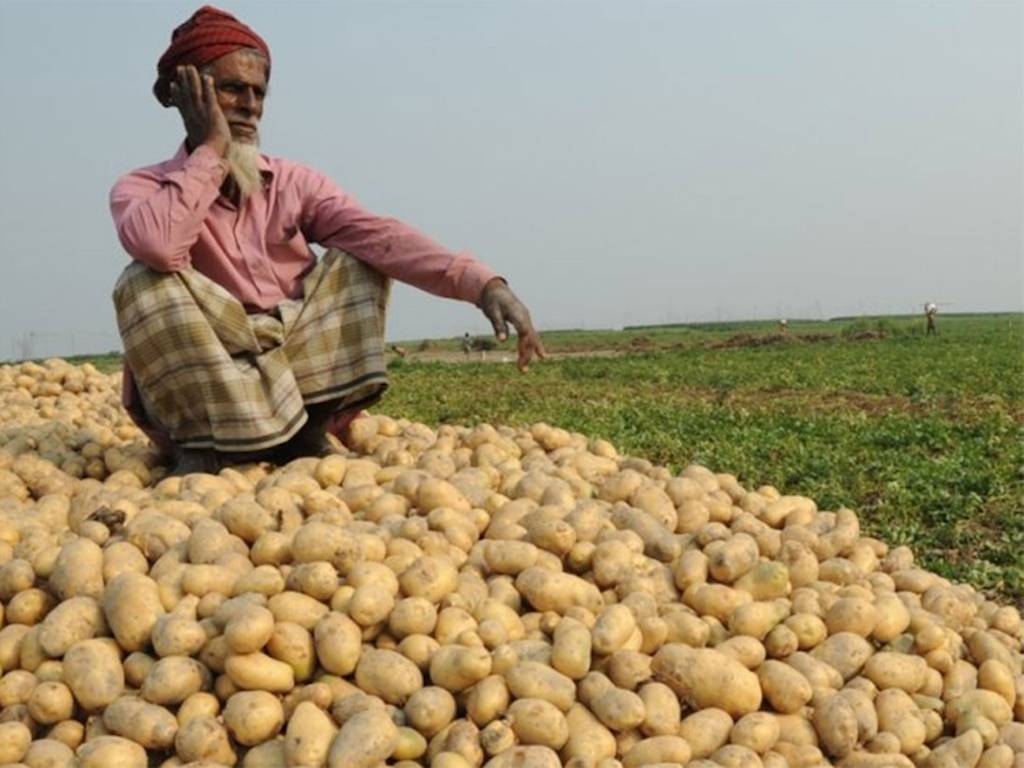

Screening of applications will begin on 07.06 2023 and will continue until the post is filled.
#Potato farmers conquer devastating with paper full#
Visit the following link: ( ) and submit your cover letter and a full C.V.Work in an equal and diverse workplace.Fixed term contract of 1 year with possibility of renewal.Competitive compensation package commensurate with experience.CIP emphasizes the synergies between social and bio-physical sciences as a core strategy for making breakthroughs in our understanding of complex development challenges in food and agriculture and for our ability to overcome these.CIP’s programs seek to strengthen broader agri-food systems to generate economic, social, and nutritional benefits for farmers, enterprises and consumers emphasizing the priorities of women and youth in particular.CIP works with partners in over 20 countries to improve diets and incomes of poor people in Africa, Asia and Latin America through scientific research, innovation, and capacity strengthening.Why should you consider this opportunity? Advanced written and oral communication skills in English.Excellent interpersonal communication and good personal organization skills.Strong organizational and time-management skills.Excellent writing and verbal communication skills.Ability to design and execute experiments independently.Extensive knowledge of virology principles, methods, and techniques.Experience with using loop mediated isothermal amplification (LAMP) assay.

Experience with sweetpotato virus research.At least three years of experience is required.MSc degree in virology, microbiology, or related field, or related discipline.
 Write scientific papers describing your research findings and present them at conferences. Support the introgression of Begomoviruse resistance into a pre-breeding trait deployment pipeline. Conduct screenhouse & field evaluations of the sweetpotato breeding founders, advanced clones, and wild relatives for response to Begomoviruses. Collect, purify, maintain, and multiply isolates of Begomoviruses. Collect and maintain insect transmission vectors. Assemble & maintain virus indexed plant materials for founders, advanced clones, and wild relatives of sweetpotato. This position will focus on identifying novel sources of alleles for sweetpotato resistance to Begomoviruses in founder genotypes, wild relatives of sweetpotato and advanced clones from the sweetpotato breeding programmes in Uganda, measure their stability across environments and increase their frequency in a pre-breeding population that can be exploited for population improvement and variety development. However, the magnitude of yield losses reported for these viruses in susceptible genotypes raises the need to identify sources of resistance alleles in the germplasm used by the sweetpotato breeding programmes for introgression into elite commercial/farmer preferred genotypes. Although breeding for resistance to viruses has been a key target of sweetpotato breeding programs across SSA, focus has mainly been on resistance to the highly symptomatic SPVD and its individual casual agents (SPFMV and SPCSV), overlooking the mostly asymptomatic Begomovirus. Apart from SPVD, several studies have reported a group of viruses belonging to the genus Begomovirus of the Geminiviridae family in farmers’ fields across the region. Viral diseases remain a major constraint to sweetpotato production across sub-Saharan with SPVD considered as the most devastating. International Potato Center (CIP) jobs in Uganda Learn more about International Potato Center (CIP) Jobs at: International Potato Center (CIP)ĭate Posted: Sunday, June 04 2023, Base Salary: Not Disclosed Similar Jobs in Uganda These findings from a research led by ICIPE - International Centre of Insect Physiology and Ecology, International Institute of Tropical Agriculture (IITA), and North Carolina State University, USA, working with various partners, have been published recently in Nature Sustainability ( ).Research Associate ,virology It involves enclosing potato seed before planting in a thick absorbent paper that is made from the bark of the banana stem, which provides a protective barrier for the plants against damage by the potato cyst nematode (PCN). The organic technology was developed from banana plant waste material and is known as ‘wrap and plant’. thus, boosting yields fivefold in trials with small-scale farmers in Kenya." Researchers have shown how a paper pouch from banana fibers "disrupts hatching of cyst nematodes and prevents them from finding potato roots.
Write scientific papers describing your research findings and present them at conferences. Support the introgression of Begomoviruse resistance into a pre-breeding trait deployment pipeline. Conduct screenhouse & field evaluations of the sweetpotato breeding founders, advanced clones, and wild relatives for response to Begomoviruses. Collect, purify, maintain, and multiply isolates of Begomoviruses. Collect and maintain insect transmission vectors. Assemble & maintain virus indexed plant materials for founders, advanced clones, and wild relatives of sweetpotato. This position will focus on identifying novel sources of alleles for sweetpotato resistance to Begomoviruses in founder genotypes, wild relatives of sweetpotato and advanced clones from the sweetpotato breeding programmes in Uganda, measure their stability across environments and increase their frequency in a pre-breeding population that can be exploited for population improvement and variety development. However, the magnitude of yield losses reported for these viruses in susceptible genotypes raises the need to identify sources of resistance alleles in the germplasm used by the sweetpotato breeding programmes for introgression into elite commercial/farmer preferred genotypes. Although breeding for resistance to viruses has been a key target of sweetpotato breeding programs across SSA, focus has mainly been on resistance to the highly symptomatic SPVD and its individual casual agents (SPFMV and SPCSV), overlooking the mostly asymptomatic Begomovirus. Apart from SPVD, several studies have reported a group of viruses belonging to the genus Begomovirus of the Geminiviridae family in farmers’ fields across the region. Viral diseases remain a major constraint to sweetpotato production across sub-Saharan with SPVD considered as the most devastating. International Potato Center (CIP) jobs in Uganda Learn more about International Potato Center (CIP) Jobs at: International Potato Center (CIP)ĭate Posted: Sunday, June 04 2023, Base Salary: Not Disclosed Similar Jobs in Uganda These findings from a research led by ICIPE - International Centre of Insect Physiology and Ecology, International Institute of Tropical Agriculture (IITA), and North Carolina State University, USA, working with various partners, have been published recently in Nature Sustainability ( ).Research Associate ,virology It involves enclosing potato seed before planting in a thick absorbent paper that is made from the bark of the banana stem, which provides a protective barrier for the plants against damage by the potato cyst nematode (PCN). The organic technology was developed from banana plant waste material and is known as ‘wrap and plant’. thus, boosting yields fivefold in trials with small-scale farmers in Kenya." Researchers have shown how a paper pouch from banana fibers "disrupts hatching of cyst nematodes and prevents them from finding potato roots.







 0 kommentar(er)
0 kommentar(er)
